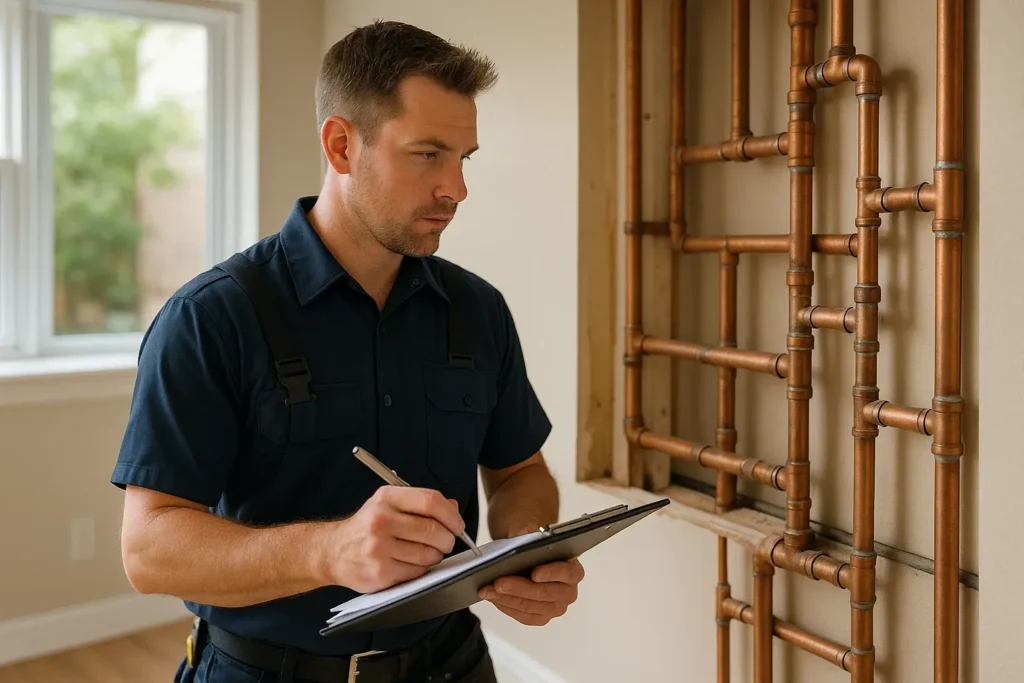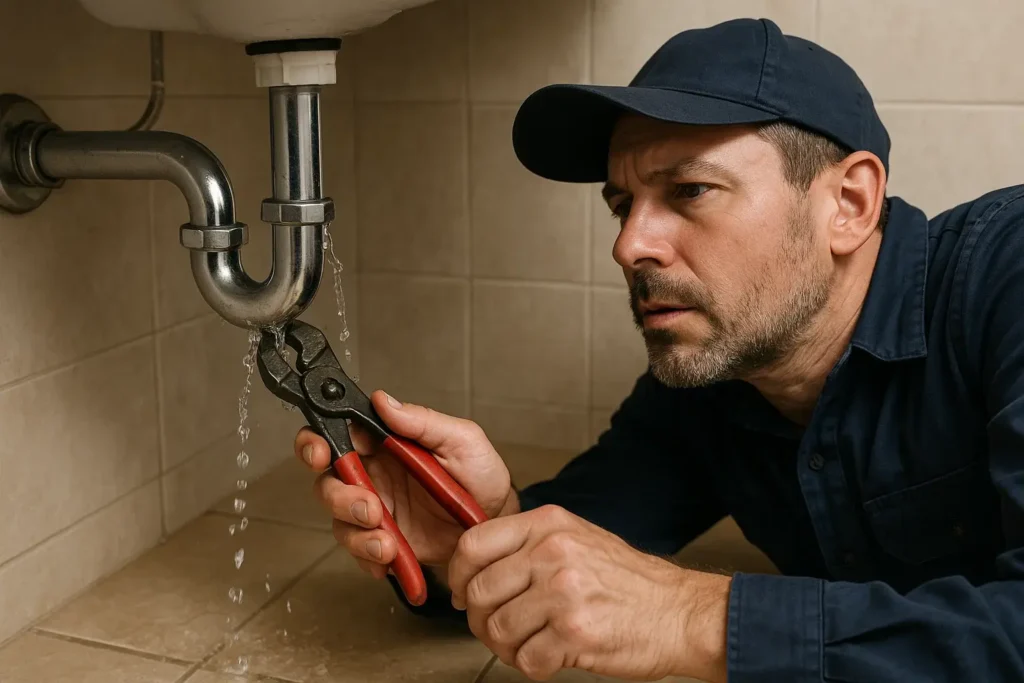

Martin had lived in his charming 1940s Edmonds bungalow for nearly two decades, enjoying its view of the water. With its hardwood floors, original moldings, and cozy fireplace, the house had a timeless appeal. But while the home’s character remained intact, its plumbing told a different story one that was about to require the expertise of repiping specialists.
It began subtly a noticeable drop in water pressure in the kitchen. Then, brownish water started appearing in the bathroom sink whenever he turned on the tap after a long weekend away. At first, Martin assumed it was sediment or a faulty valve, so he called Fast Plumbing and Drain, known locally as trusted plumbing repipe specialists.
The plumber, a seasoned repipe specialist, took one look at the exposed pipes in the basement and frowned. After some testing and a camera inspection, he delivered the news Martin had hoped not to hear: the home’s galvanized steel pipes were severely corroded and leaking internally. Patches and partial fixes wouldn’t cut it. “This whole system is at the end of its life,” the plumber explained. “You’ve got rust, restricted flow, and micro-leaks throughout. The real solution is a full home repipe.”
Though the cost and disruption worried him, Martin understood the logic. Over the next week, the repipe specialists near me team carefully replaced every outdated pipe with modern, durable PEX tubing. Walls were opened with surgical precision and patched afterward with care. The crew from Fast Plumbing and Drain worked efficiently, ensuring Martin always had running water in at least one bathroom.
By the end of the job, not only was the water pressure back to normal it was better than ever. The water ran clean, the fixtures functioned flawlessly, and Martin no longer had to worry about hidden leaks slowly damaging his beloved home. “It’s like giving the house a new set of arteries,” the plumber said with a smile.
Martin realized that while repiping hadn’t been in his plans, it was the smartest investment he could have made. Thanks to repipe plumbing experts, his home was protected for decades to come.
Whether you’re dealing with low pressure, rusty water, or aging galvanized pipes, working with experienced repipe home specialists can make all the difference. Martin’s story is a powerful reminder: sometimes, the best way to preserve a home’s legacy is by starting with what’s behind the walls.
Nobody wakes up and say, “Ya know, I think I wanna repipe my house.” Repiping is the most expensive solution, and should only be taken when no feasible alternatives exist. A homeowner can often tell that a home’s plumbing system is nearing the end of its life by watching for the following warning signs:
If water trickles weakly from multiple fixtures, it’s a sign of internal pipe corrosion or buildup, especially in galvanized steel or iron pipes, restricting flow over time.
Regular repairs or recurring leaks in different parts of the home indicates system-wide pipe fatigue. Minor patch jobs won’t hold if the overall plumbing system is deteriorating.
Brown or yellow water—especially after the water has been off—signals rusting pipes, a common problem in older galvanized systems.
Pipe is laid down with a known lifespan of: Galvanized steel: ~40–60 years, Copper: ~50+ years, PVC/CPVC: ~40–50 years, Brass: ~40–70 years. If your pipes are near or past these limits, they may be overdue for replacement, even if no major issue has happened yet.
A spike in your water bill without any increase in usage can mean hidden leaks or water loss through damaged pipes.
Wet spots, ceiling stains, or mold growth is a sign of hidden leaks behind walls or under floors. Multiple or recurring signs like this point to systemic issues.
Sounds like “water hammer,” knocking, or high-pitched squeals indicates loose, poorly secured, or corroded pipes, or air pressure problems from leaks.
Check any exposed piping in the basement or utility areas. Flaking, rust, dimpling, or discoloration suggests decay or impending failure.
Older homes with poorly designed systems or materials no longer up to code (like lead or polybutylene pipes), which should be replaced for safety and efficiency.
If you see more than one of these signs, it’s a strong indication that your plumbing system may be reaching the end of its life. Fast Plumbing and Drain can perform a system-wide inspection and advise whether a full repipe, partial replacement, or targeted repair is the best course of action. Even if there’s no major issue today, replacing an aging system proactively can prevent water damage, health hazards, and emergency repair costs down the line.
Fast Plumbing and Drain’s process for doing a whole-house repiping is a carefully planned, multi-step operation that replaces all (or most) of a home’s existing plumbing system with new, modern piping. We eliminate outdated, corroded, or leaking pipes and install a reliable system that meets current building codes and future needs. Here’s a step-by-step breakdown:
The plumber starts with a thorough inspection of the home’s current plumbing system—identifying pipe material, layout, and access points. He’ll assess factors like home size, number of bathrooms, wall construction, and foundation type (slab, crawl space, basement). Based on this, the plumber provides an estimate, timeline, and repiping plan—including pipe type (usually PEX, copper, or CPVC), number of workers, and how water will be temporarily routed.
Before any work begins, the plumber and crew protect flooring and furniture with plastic sheeting and drop cloths. Water to the home is shut off, and drain-down procedures begin to empty the system.
The crew cuts strategic holes in drywall—typically behind sinks, under cabinets, in ceilings, and near pipe chaseways—to expose plumbing runs. In crawlspaces or basements, pipes may be more directly accessible.
Old pipes are carefully removed to avoid unnecessary damage to structural components. Depending on the pipe material (e.g., galvanized steel, polybutylene), special tools may be used to loosen and extract sections.
New pipes (typically PEX for flexibility or copper for durability) are run throughout the home. Hot and cold water lines are routed to every fixture. New shutoff valves are installed at sinks, toilets, and appliances. Pipes are securely anchored, insulated, and tested for code compliance.
The entire system is pressure tested to check for leaks or weak connections before walls are closed. Any issues are addressed immediately.
Depending upon location, a municipal or third-party inspector may visit the site to verify the new system meets local plumbing codes. The plumber provides documentation and warranty info for the new piping system.
A professional whole-house repipe is a major but manageable upgrade. It involves careful planning, surgical pipe replacement, and code-compliant installation—all designed to ensure the home’s plumbing is safe, efficient, and worry-free for decades to come.



We ensure quality service, offer guarantees, and provide ongoing support. Here’s what we do:
We provide a warranty on our workmanship. If there are installation errors or faulty work, it will be corrected.
We install reliable, energy-efficient plumbing components from reputable brands. We use manufacturer-approved parts to ensure longevity and performance.
We ensure the equipment is installed to the manufacture’s specifications, preserving the warranty.
We test the system post-installation to confirm proper operation. We then check for issues and seals before completing the job.
We provide customers a detailed invoice outlining the work performed, parts used, and warranty terms.
We encourage customers to enroll in our preventative maintenance plan for ongoing tune-ups and priority service.
We check in with customers after installation or repair to ensure satisfaction. We also offer 24/7 emergency support in case of urgent issues.
We stay up to date with state plumbing licensing through the Washington State Department of Labor & Industries and the Uniform Plumbing Code, and ongoing training.
By backing up our customers, we provide peace of mind and ensure long-term satisfaction with our work.
We’re a second-generation business with over 40 years of on-the-job experience. Our deep knowledge means we diagnose and solve problems faster, saving you time and money.
No hidden fees or surprise upcharges. The price we quote is the price you pay.
We offer warranties that protect your plumbing system —1 year on parts and 3 years on labor for new installations.
We go the extra mile to ensure no dings on your walls or scratches on your floors during repairs.
All our plumbers undergo criminal background checks and drug tests, so you can feel confident in who’s in your home.
We believe in offering pricing that reflects real value—ensuring you get the plumbing service you need without having to overpay.


The cost to repipe a house can vary depending on factors like the size of your home, the type of pipe material used (PEX vs. copper), accessibility, and local permit requirements. On average, you can expect to pay between $4,000 and $15,000 for a full home repipe. We provide free estimates so you’ll know exactly what to expect before any work begins.
For most homes, a full repipe takes 2 to 5 days. Our crew works efficiently to ensure minimal disruption, and we make sure you always have access to at least one working bathroom during the process.
Repiping includes inspecting the existing plumbing, removing old pipes, installing new pipes (usually PEX or copper), pressure testing the new system, and restoring any drywall or finishes. Our repipe specialists handle every step with precision and professionalism.
You can expect some minor wall access cuts (which we carefully patch afterward), temporary water shutoffs, and a crew working in multiple rooms. We take great care to protect your home and clean up thoroughly after the work is done.
Common signs include low water pressure, rusty or discolored water, frequent leaks, visible pipe corrosion, and unusually high water bills. If your home has galvanized pipes and is over 40 years old, it may be time for a full evaluation.
Typically, homeowners insurance does not cover repiping due to age-related wear and tear. However, it may cover water damage caused by pipe failure. We recommend checking with your insurance provider for details.
Both are excellent options. PEX is flexible, cost-effective, and resistant to scale and corrosion. Copper is durable and long-lasting, but more expensive. We’ll recommend the best option based on your home’s needs and your budget.
In most cases, no. We plan the repipe in phases to ensure that you always have access to essential plumbing. Many of our customers stay in their homes comfortably throughout the entire process.
Yes! We provide a 1-year parts warranty and a 3-year labor warranty on new installations. We also install manufacturer-approved parts to preserve any extended equipment warranties.
Repipe specialists generally charge based on home size, plumbing layout, and pipe material. For a typical 2- or 3-bedroom house, pricing can range from $4,000 to $10,000+, depending on complexity. At Fast Plumbing & Drain, we offer transparent, upfront pricing with no hidden fees.
Let’s bring your vision to life with expert craftsmanship and thoughtful design.
16120 Woodinville Redmond Rd NE STE. 15
Woodinville, WA 98072
(425) 629-9564
hello@fastwaterheater.com
Monday – Friday 7:30am-5pm
24/7 Emergency Service Available
Construction
FASTWWH948BC
Plumbing
FASTWWH79901